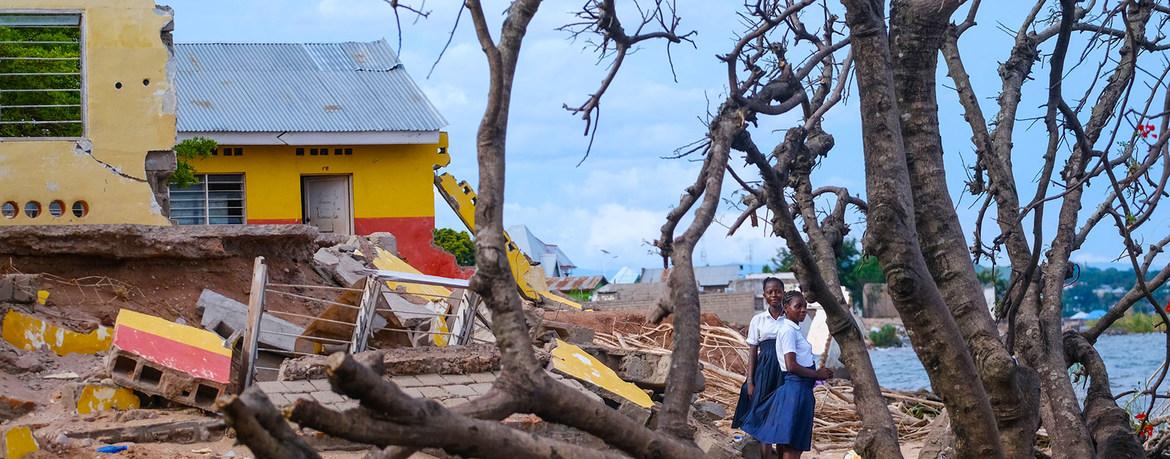The Paper's chief reporter Liu Dong

On 26 October, on the eve of this weekend's United Nations Climate Conference in Glasgow, Uk., on October 26, the United Nations Environment Programme (UNEP) warned in its latest Emissions Gap Report 2021 The Heat Is On that the latest climate commitments reported by countries fall far short of the levels required to meet the Paris Agreement's temperature control targets, which will put the world on the line" At least 2.7 °C" of catastrophic orbits warmed up at the end of the century.
U.N. Secretary-General António Guterres described the report's findings as a "deafening wake-up call" to world leaders, while scientists called on countries to take "drastic action" against fossil fuel companies.
This year marks the 12th consecutive year that the report has been published. The report notes that the updated Nationally Determined Contribution Reduction Targets (NDCs) reported by countries, as well as some other climate change mitigation commitments that have been announced, have reduced their annual greenhouse gas emissions by only 7.5 percent from the previous round (2015) commitments. However, the lowest-cost path to maintaining the Paris Agreement's 2°C temperature target requires a 30% reduction, while to achieve the 1.5°C target, a 55% reduction would be required. We are still a long way from our goal, and time is running out.
Hope dawns
The report notes that a commitment to "net zero" (zero carbon emissions, i.e. carbon neutrality) could have extraordinary effects. If fully implemented, these "net zero" commitments help to limit global warming to 2.2°C, giving the world a glimmer of hope that further climate action can still prevent the catastrophic effects of climate change. However, the current global "net zero" commitment remains vague, most incomplete and inconsistent with the 2030 NATIONALLY DETERMINED contribution targets for most countries.
As of 30 September 2021, more than 120 countries accounting for more than half of global greenhouse gas emissions have reported new or updated versions of their NATIONALLY Determined Contribution Targets. In addition, three G20 member countries announced new climate change mitigation commitments for 2030.
To move the world on track to meet the 1.5°C temperature target, the world needs to reduce its annual carbon emissions by an additional 28 billion tonnes of CARBON dioxide equivalent by 2030, which is beyond the scale of reductions promised by the current updated NDW Targets and the combined global emissions of industrial, agricultural, waste and land-use change.
Net Zero target
Currently, 49 countries and the European Union have committed to achieving the "net zero" target, which covers more than half of the world's domestic greenhouse gas emissions, more than half of the world's gross domestic product (GDP) and 13% of the global population, of which 11 countries have been enshrined in the law, accounting for 12% of global emissions.
The report found that while the "net zero" commitment and its effective implementation could make a significant difference, the current plans are vague and not reflected in the NDCs target.
If ambitious "net zero" targets can be set and fully implemented, it could help reduce global warming by an additional 0.5°C. However, many countries have postponed action until after 2030 in their climate plans, raising questions about whether they can deliver on their "net zero" commitments. Despite the "net zero" commitments made by the 12 G20 member countries, the targets remain highly vague. The report also assesses the "net zero" plans of nine G20 member countries, five of which are on a linear path to achieving "net zero" emissions, with "net zero" climate action consistently distributed across the timeline rather than postponing it beyond 2030.
Potential for emission reductions
The annual Emissions Gap Report looks at the potential for reducing emissions in specific sectors. This year, the report focuses on methane emissions and market mechanisms. Reducing methane emissions from fossil fuels, waste and the agricultural sector could help close the emissions gap and slow the warming in the short term.
Methane emissions are the second leading cause of global warming. If only the 20-year cycle time is calculated, the methane warming potential is more than 80 times that of carbon dioxide. However, methane has a shorter lifespan in the atmosphere than carbon dioxide, only 12 years, while carbon dioxide can remain in the atmosphere for hundreds of years. Therefore, reducing methane emissions can help limit global warming more rapidly.
Existing free or low-cost technological measures alone can reduce anthropogenic methane emissions by about 20% per year. The implementation of all measures, as well as broader structural and behavioural measures, could reduce anthropogenic methane emissions by about 45 percent.
At the same time, carbon markets have the potential to reduce costs, thereby helping to drive more ambitious global commitments to reduce emissions, but only if the "rules" are clearly defined to ensure that transactions reflect actual emissions reductions, supported by arrangements such as tracking progress and maintaining transparency.
The report concludes by noting that most countries are missing out on the opportunity to make the most of COVID-19 fiscal relief and recovery spending to stimulate the economy and support climate action.
The pandemic has led to a 5.4% reduction in global carbon dioxide emissions in 2020. However, greenhouse gas emissions are expected to rise again in 2021 to levels that are only slightly below the record highs of 2019.
As of May 2021, only 17 to 19 percent of total global recovery investment will help reduce greenhouse gas emissions. Nearly 90 percent of that spending came from six G20 member countries and one guest country: South Korea, Spain, Germany, the United Kingdom, China, France and Japan.
The report notes that low-income economies spend far less on COVID-19 recovery ($60 per capita) than advanced economies ($11,800 per capita), and that funding gaps could exacerbate the gap between fragile countries and developed countries in terms of climate resilience and mitigation measures.
Editor-in-charge: Hu Zhenqing
Proofreader: Luan Meng